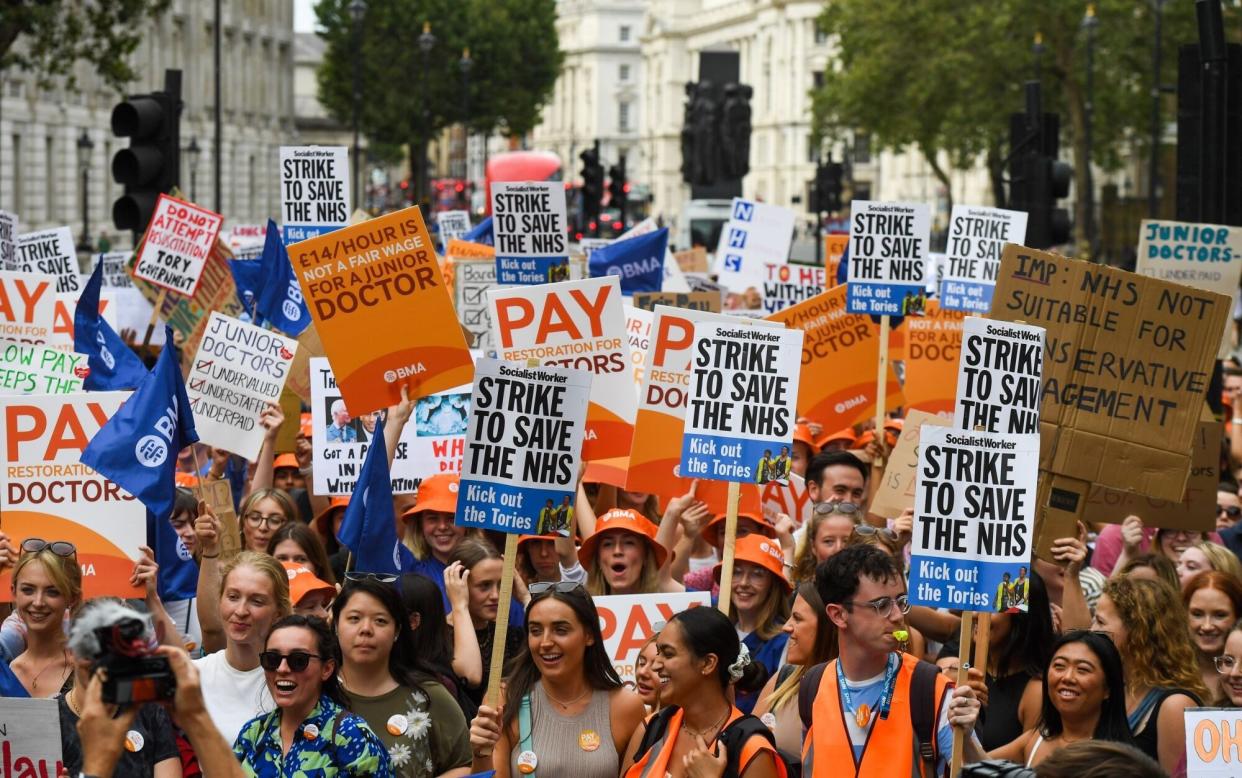Hospitals to send 10,000 patients home ahead of junior doctor strikes

Hospitals have been ordered to send around 10,000 patients home, ahead of doctors’ strikes.
Health officials have also ordered NHS trusts in England to do as much time-critical activity as they can before the walkouts amid fears that fresh strikes by junior doctors before and after Christmas will cripple the health service.
The timing of the strikes, with the first starting on Dec 20, has sparked concern that it will mean thousands of patients get stuck in hospital because there are too few staff to discharge them.
England’s director of NHS resilience has now written to every hospital chief executive with instructions to cut bed occupancy dramatically now, in an attempt to prevent the system grinding to a halt.
Trusts are being told to get occupancy down to 85 per cent from the current figure of around 95 per cent. This means around 10,000 patients being sent home as a matter of urgency.
‘Very challenging time’
In the letter Stephen Groves said: “We know that the new rounds of action announced this week come at an already very challenging time for the system alongside winter pressures such as flu, Covid and norovirus.
“Over previous periods of industrial action, we have seen not just a significant impact on patients waiting for elective care but also an increased risk to patients who need time-critical care too. We are grateful for the significant amount of work being undertaken already to prepare for this disruption, which comes at the most challenging and pressured time for frontline staff.”
The missive, sent on Friday night says: “We recognise the NHS and partners are already working hard to discharge patients who are clinically fit and reduce occupancy levels as much as possible ahead of Christmas and New Year.
“This will ensure organisations have sufficient headroom to safely manage the normal rise in occupied beds in the two weeks following Christmas. It will be particularly important that trusts are able to maximise the impact of the normal working days between Christmas Day and 3 January to ensure occupancy is as low as possible, ahead of the second period of industrial action.
“This will support the effective functioning of urgent and emergency care on strike days and is even more important in the context of the period of disruption brought on by this industrial action.”
‘Review and optimise waiting lists’
Trusts have been told to use the next few days to “review and optimise waiting lists to ensure time-critical surgery is undertaken where possible ahead of the strikes.
At the same time they have been instructed to dramatically reduce the number of patients taking up hospital beds.
The letter gives hospitals two weeks to decant thousands of patients - mainly elderly - to care homes and their own homes, in an effort similar to the attempt to “protect the NHS” at the start of the Covid pandemic.
In the instructions Mr Groves says: “W/c 18 December – prepare and manage industrial action, including the action on occupancy levels and discharge set out above with the aim of reducing acute trust occupancy to 85 per cent or below, as far as possible.”
The strikes, announced earlier this week, will include the longest strikes in NHS history, with a three-day walk-out before Christmas followed by six days of strikes in the New Year.
Nurses threaten to ballot
The BMA announced the plan after accusing the Government of failing to “present a credible offer” for a payrise. The offer under discussion involved extra investment of 3 per cent, on top of an average increase of 8.8 per cent.
Last week nurses threatened to ballot on future strikes, after consultants were offered a much larger increase.
Wes Streeting, shadow health secretary, attacked the Government’s approach, saying nurses should not have been given a smaller rise. Mr Streeting said ministers had got their priorities “completely wrong” in offering consultants a bigger percentage pay rise – and said he could see why the deal felt like a “slap in the face” to nurses.
Last week Victoria Atkins, the Health Secretary, announced a pay offer to consultants that will mean a rise of up to 12.8 per cent (or around £20,000 for the best paid).

 Yahoo News
Yahoo News 
